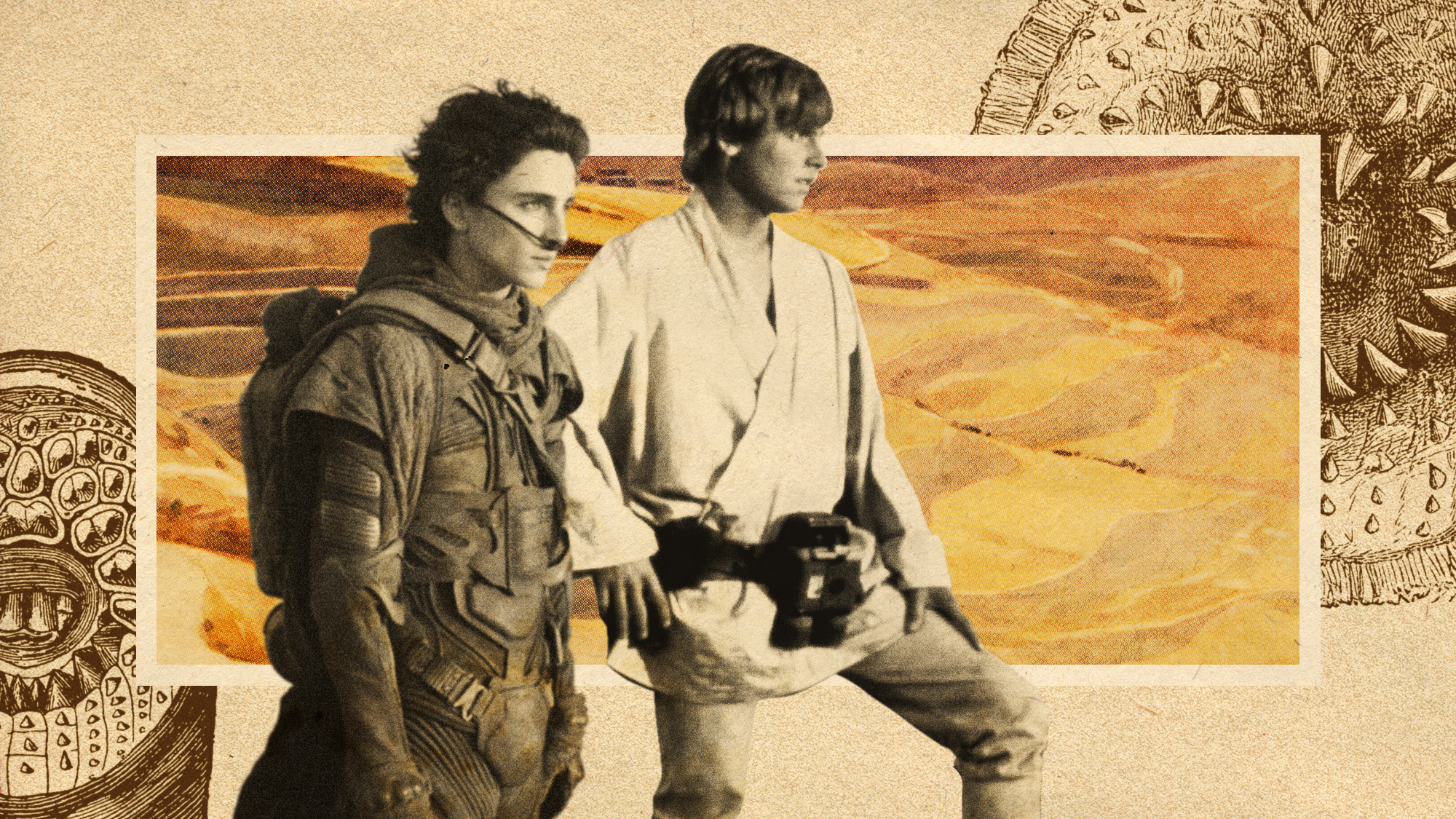How 'Star Wars' ripped off 'Dune'
Quite a few people believe that George Lucas ripped off Frank Herbert's sci-fi universe. So does Herbert himself.


A free daily email with the biggest news stories of the day – and the best features from TheWeek.com
You are now subscribed
Your newsletter sign-up was successful
Denis Villeneuve's "Dune: Part Two" revived a slumping box office at the beginning of March and has been heralded as a generally impressive book-to-film translation. Adapting the first installment in Frank Herbert's six-part science fiction series about political struggles on a desert planet proved to be a righteous challenge. But the epic cinematic journey likely appeared strikingly familiar to "Star Wars" fans, seeing as George Lucas' massively successful film franchise is also a sci-fi series about political struggles partially set on a desert planet. As it turns out, that is no accident. Quite a few people believe that "Star Wars" ripped off Herbert's "Dune" universe — including Herbert himself.
The proof is in the similarities
Following its 1965 release, "Dune" became a seminal and ubiquitous addition to the science fiction canon, inspiring countless genre imitations. But what "Star Wars" borrowed from it was blatant, especially considering how famous George Lucas' blockbusters would become. Herbert has answered several questions about this unofficial rivalry over the years, beginning with an Associated Press press interview in 1977 (the same year "A New Hope" came out). "It's clear that while Herbert hadn't yet seen the movie, he did have some thoughts about its similarities," said Austen Goslin at Polygon of the interview. "I will try hard not to sue," Herbert told the AP at the time. In 1985, during a speaking engagement at UCLA, Herbert noted there were a whopping "16 points of identity between the book 'Dune' and 'Star Wars,'" admitting the odds of this being a coincidence were slim to none. Apparently, Herbert often joked that Lucas owed him dinner.
"The two share an enormous amount of similarities, from their galactic setting to their character journeys and more," said Lindsey Romain, who compiled a list of all the elements "Star Wars" borrowed from "Dune" for Nerdist. The most obvious, perhaps, is the dual settings of inhospitable desert planets: "Star Wars" protagonist Luke Skywalker is from Tatooine, while the central figure in "Dune," Paul Atreides, moves to Arrakis. More environmental resemblances include these planets' desert-dwelling people (the Fremen in "Dune" and the Jawas and Tusken Raiders in "Star Wars") and deadly sand-dwelling creatures (sandworms in "Dune" and sarlaccs in "Star Wars"). Additionally, both universes are ruled by evil emperors (and "both sagas are eventually about the collapse of this totalitarian system of government," said Romain). Plus, the heroic young protagonists are both "Chosen One" hopefuls and descendants of a presiding villain (Luke is Darth Vader's son, and — spoiler alert — Paul learns he is the grandchild of a Harkonnen). There are lots of other likenesses too, from "spice" as a drug in both series to Herbert's charming philanderer Duncan Idaho predating Han Solo to the Bene Gesserit-like mind control powers of the Jedi.
The Week
Escape your echo chamber. Get the facts behind the news, plus analysis from multiple perspectives.

Sign up for The Week's Free Newsletters
From our morning news briefing to a weekly Good News Newsletter, get the best of The Week delivered directly to your inbox.
From our morning news briefing to a weekly Good News Newsletter, get the best of The Week delivered directly to your inbox.
Comparisons are odious
No art exists in a vacuum. While George Lucas clearly borrowed from Frank Herbert — and has never publicly acknowledged the inspiration, which is a chief complaint among "Dune" fans — he was also extensively influenced by the samurai films of Akira Kurosawa, among other works of art. No one can say Lucas did not add touches of his own to "Star Wars," like lightsabers (cool!) and a lighthearted sensibility that is dissimilar to Herbert's work (let's just say there is no Chewbacca equivalent).
If we are really going to nitpick (be warned: more "Dune" spoilers ahead), Paul Atreides' counterpart is actually Anakin Skywalker, not Luke — and we only see Anakin's journey in the later "Star Wars" prequel films from the 2000s, which some fans prefer to ignore. The original "Star Wars" trilogy features Anakin once he has become Darth Vader, who is akin to Paul Atreides much further down the road, as the "Dune" hero ultimately emerges into an ultra-powerful, tragic and villainous figure.
Herbert had his outside influences too, including Greek mythology, Islam and Middle Eastern religious practices, Isaac Asimov's "Foundation" series and quite possibly his own psychedelic drug use. "Every fantasy reflects the place and time that produced it," said Hari Kunzru for The Guardian. Kunzru also notes that Herbert and a number of his colleagues "formed a joke organization called the We're Too Big to Sue George Lucas Society," lamenting the imperviousness of Lucas' "money-spinning franchise."
Despite the longstanding grumbles, no one can deny that both of these series are essential science fiction. Lucas, however, still should have taken Herbert out to dinner.
A free daily email with the biggest news stories of the day – and the best features from TheWeek.com
Anya Jaremko-Greenwold has worked as a story editor at The Week since 2024. She previously worked at FLOOD Magazine, Woman's World, First for Women, DGO Magazine and BOMB Magazine. Anya's culture writing has appeared in The Atlantic, Jezebel, Vice and the Los Angeles Review of Books, among others.
-
 How the FCC’s ‘equal time’ rule works
How the FCC’s ‘equal time’ rule worksIn the Spotlight The law is at the heart of the Colbert-CBS conflict
-
 What is the endgame in the DHS shutdown?
What is the endgame in the DHS shutdown?Today’s Big Question Democrats want to rein in ICE’s immigration crackdown
-
 ‘Poor time management isn’t just an inconvenience’
‘Poor time management isn’t just an inconvenience’Instant Opinion Opinion, comment and editorials of the day
-
 Book reviews: ‘Bonfire of the Murdochs’ and ‘The Typewriter and the Guillotine’
Book reviews: ‘Bonfire of the Murdochs’ and ‘The Typewriter and the Guillotine’Feature New insights into the Murdoch family’s turmoil and a renowned journalist’s time in pre-World War II Paris
-
 Microdramas are booming
Microdramas are boomingUnder the radar Scroll to watch a whole movie
-
 Film reviews: ‘Wuthering Heights,’ ‘Good Luck, Have Fun, Don’t Die,’ and ‘Sirat’
Film reviews: ‘Wuthering Heights,’ ‘Good Luck, Have Fun, Don’t Die,’ and ‘Sirat’Feature An inconvenient love torments a would-be couple, a gonzo time traveler seeks to save humanity from AI, and a father’s desperate search goes deeply sideways
-
 The biggest box office flops of the 21st century
The biggest box office flops of the 21st centuryin depth Unnecessary remakes and turgid, expensive CGI-fests highlight this list of these most notorious box-office losers
-
 The 8 best superhero movies of all time
The 8 best superhero movies of all timethe week recommends A genre that now dominates studio filmmaking once struggled to get anyone to take it seriously
-
 Book reviews: ‘Hated by All the Right People: Tucker Carlson and the Unraveling of the Conservative Mind’ and ‘Football’
Book reviews: ‘Hated by All the Right People: Tucker Carlson and the Unraveling of the Conservative Mind’ and ‘Football’Feature A right-wing pundit’s transformations and a closer look at one of America’s favorite sports
-
 Josh D’Amaro: the theme park guru taking over Disney
Josh D’Amaro: the theme park guru taking over DisneyIn the Spotlight D’Amaro has worked for the Mouse House for 27 years
-
 Book reviews: ‘Vigil: A Novel’ and ‘Fear and Fury: The Reagan Eighties, the Bernie Goetz Shootings, and the Rebirth of White Rage’
Book reviews: ‘Vigil: A Novel’ and ‘Fear and Fury: The Reagan Eighties, the Bernie Goetz Shootings, and the Rebirth of White Rage’Feature Taking on the space between life and death and a look back at a 1984 shooting that shocked New York City
